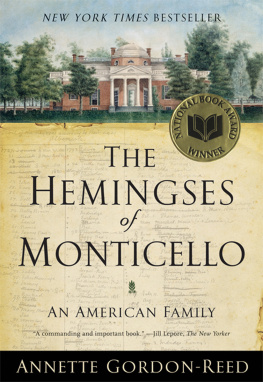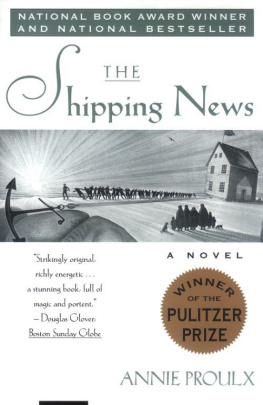
E. Annie Proulx
The Shipping News
***

For John, Gillis and Morgan
In a knot of eight crossings, which is about the average-size knot,
there are 256 different over-and-under arrangements
possible Make only one change in this over and under
sequence and either an entirely different knot is made
or no knot at all may result.
THE ASHLEY BOOK OF KNOTS
Help came from many directions in the writing of The Shipping News. I am grateful to the National Endowment for the Arts for financial support, and to the Ucross Foundation of Wyoming for a quiet place to work. In Newfoundland, advice, commentary and information from many people helped me understand old ways and contemporary changes on The Rock. The Newfoundland wit and taste for conversation made the most casual encounters a pleasure. I am particularly grateful for the kindness and good company of Bella Hodge of Gunners Cove and Goose Bay who suffered dog bite on my account and showed me the delights of Newfoundland home cooking. Carolyn Lavers opened my eyes to the complexities and strengths of Newfoundland women, as did novelist Bill Gough in his 1984 Mauds House. Canadian Coast Guard Search and Rescue personnel, the staff of the Northern Pen in St. Anthony, fishermen and loggers, the Atmospheric Environment Service of Environment Canada all told me how things worked. John Glusmans fine-tuned antennae caught the names of Newfoundland books I would otherwise have missed. Walter Punch of the Massachusetts Horticultural Society Library confirmed some obscure horticultural references. Thanks also to travel companions on trips to Atlantic Canada: Tom Watkin, who battled wind, bears and mosquitoes; my son Morgan Lang who shared an April storm, icebergs and caribou. I am grateful for the advice and friendship of Abi Thomas. Barbara Grossman is the editor of my dreams-clear blue sky in the heaviest fog. And without the inspiration of Clifford W. Ashleys wonderful 1944 work, The Ashley Book of Knots, which I had the good fortune to find at a yard sale for a quarter, this book would have remained just the thread of an idea.
A Flemish flake is a spiral coil of one layer only.
It is made on deck, so that it may be
walked on if necessary.
THE ASHLEY BOOK OF KNOTS

HERE is an account of a few years in the life of Quoyle, born in Brooklyn and raised in a shuffle of dreary upstate towns.
Hive-spangled, gut roaring with gas and cramp, he survived childhood; at the state university, hand clapped over his chin, he camouflaged torment with smiles and silence. Stumbled through his twenties and into his thirties learning to separate his feelings from his life, counting on nothing. He ate prodigiously, liked a ham knuckle, buttered spuds.
His jobs: distributor of vending machine candy, all-night clerk in a convenience store, a third-rate newspaperman. At thirty-six, bereft, brimming with grief and thwarted love, Quoyle steered away to Newfoundland, the rock that had generated his ancestors, a place he had never been nor thought to go.
A watery place. And Quoyle feared water, could not swim. Again and again the father had broken his clenched grip and thrown him into pools, brooks, lakes and surf. Quoyle knew the flavor of brack and waterweed.
From this youngest sons failure to dog-paddle the father saw other failures multiply like an explosion of virulent cells-failure to speak clearly; failure to sit up straight; failure to get up in the morning; failure in attitude; failure in ambition and ability; indeed, in everything. His own failure.
Quoyle shambled, a head taller than any child around him, was soft. He knew it. Ah, you lout, said the father. But no pygmy himself. And brother Dick, the fathers favorite, pretended to throw up when Quoyle came into a room, hissed Lardass, Snotface, Ugly Pig, Warthog, Stupid, Stinkbomb, Fart-tub, Greasebag, pummeled and kicked until Quoyle curled, hands over head, sniveling, on the linoleum. All stemmed from Quoyles chief failure, a failure of normal appearance.
A great damp loaf of a body. At six he weighed eighty pounds. At sixteen he was buried under a casement of flesh. Head shaped like a crenshaw, no neck, reddish hair ruched back. Features as bunched as kissed fingertips. Eyes the color of plastic. The monstrous chin, a freakish shelf jutting from the lower face.
Some anomalous gene had fired up at the moment of his begetting as a single spark sometimes leaps from banked coals, had given him a giants chin. As a child he invented stratagems to deflect stares; a smile, downcast gaze, the right hand darting up to cover the chin.
His earliest sense of self was as a distant figure: there in the foreground was his family; here, at the limit of the far view, was he. Until he was fourteen he cherished the idea that he had been given to the wrong family, that somewhere his real people, saddled with the changeling of the Quoyles, longed for him. Then, foraging in a box of excursion momentoes, he found photographs of his father beside brothers and sisters at a ships rail. A girl, somewhat apart from the others, looked toward the sea, eyes squinted, as though she could see the port of destination a thousand miles south. Quoyle recognized himself in their hair, their legs and arms. That sly-looking lump in the shrunken sweater, hand at his crotch, his father. On the back, scribbled in blue pencil, Leaving Home, 1946.
At the university he took courses he couldnt understand, humped back and forth without speaking to anyone, went home for weekends of excoriation. At last he dropped out of school and looked for a job, kept his hand over his chin.
Nothing was clear to lonesome Quoyle. His thoughts churned like the amorphous thing that ancient sailors, drifting into arctic half-light, called the Sea Lung; a heaving sludge of ice under fog where air blurred into water, where liquid was solid, where solids dissolved, where the sky froze and light and dark muddled.
He fell into newspapering by dawdling over greasy saucisson and a piece of bread. The bread was good, made without yeast, risen on its own fermenting flesh and baked in Partridges outdoor oven. Partridges yard smelled of burnt cornmeal, grass clippings, bread steam.
The saucisson, the bread, the wine, Partridges talk. For these things he missed a chance at a job that might have put his mouth to bureaucracys taut breast. His father, self-hauled to the pinnacle of produce manager for a supermarket chain, preached a sermon illustrated with his own history-I had to wheel barrows of sand for the stonemason when I came here. And so forth. The father admired the mysteries of business-men signing papers shielded by their left arms, meetings behind opaque glass, locked briefcases.
But Partridge, dribbling oil, said, Ah, fuck it. Sliced purple tomato. Changed the talk to descriptions of places he had been, Strabane, South Amboy, Clark Fork. In Clark Fork had played pool with a man with a deviated septum. Wearing kangaroo gloves. Quoyle in the Adirondack chair, listened, covered his chin with his hand. There was olive oil on his interview suit, a tomato seed on his diamond-patterned tie.
Quoyle and Partridge met at a laundromat in Mockingburg, New York. Quoyle was humped over the newspaper, circling help-wanted ads while his Big Man shirts revolved. Partridge remarked that the job market was tight. Yes, said Quoyle, it was. Partridge floated an opinion on the drought, Quoyle nodded. Partridge moved the conversation to the closing of the sauerkraut factory. Quoyle fumbled his shirts from the dryer; they fell on the floor in a rain of hot coins and ballpoint pens. The shirts were streaked with ink.
Next page













